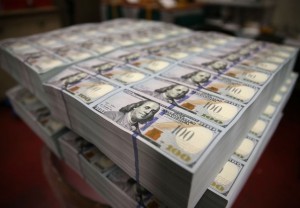 From the app to the budget book: this is how you still have money in your account at the end of the month
From the app to the budget book: this is how you still have money in your account at the end of the month
In the morning at the bakery, looking into the wallet and you just realized. Where did the bills go again? Some days the money just trickles through your fingers. But at least this is still noticeable with cash. It is more difficult to keep track of things when we pay by card. You can get a nasty surprise when looking at your account balance.
Many control their expenses by checking their accounts at the end of the month. If it is heading towards the minus side, you can refrain from going to a restaurant or wearing new pants. So it’s no wonder that many say: I can just get along with my money – no matter how much they earn.
We therefore recommend that you take a careful look at your expenses periodically. There may be more money left than you expect. For vacation, for living or retirement provision. Here are some tips to save money in 2020:
Write down all expenses!
Do not be afraid to write your expenses. The best-case scenario would be to have an accountant look at your balance, preferably one with great certified internal auditor exam results. But since you are not Bill Gates (are you?) then you should not look into hiring someone to do it for you yet.
Fortunately, there are many useful tools available to help you keep track of your household budget. Fixed costs such as rent, for example, can easily be recorded using an Excel list on your computer. You can also use the so-called export function in online banking that some banks offer. It immediately spits out an Excel table with all the debits.
However, it is cumbersome to enter the daily costs in a table, for example for food, clothing, or leisure activities. Especially on the go, because the mobile version of Excel is quite fiddly. Household apps like Money Lover are easier to use. You always have your smartphone with you anyway and can then quickly register every purchase. Assign each entry to a category such as “eating out” or “cinema”.
You should ignore the irritated looks from your friends when you pull out your cell phone after every meal. Because being considered an eccentric can be worthwhile: At the end of the month you can see your expenses as a pie chart and see at a glance what you are spending the most money on.
If you pay a lot in cash, you have to take precise notes
Which tool is best for you also depends on your payment history. There is little point in your online banking showing that your greatest expense is withdrawing cash from your account. These can be recorded more precisely with a special app for cash spending. The same applies to credit card payments that are debited as one item at the end of the month. You then also have to evaluate your credit card statement.
Tip: Make it clear to yourself from the beginning what your motivation is so that you don’t throw in the towel after a few days – for example, imagine the great vacation. Regardless of whether you type all expenses into your app immediately or collect the receipts and enter them on a fixed date, you have to stay tuned. Two to three months are a good place to start to get a feel for your income and expenses. The longer you hold out, the less irregular payments will distort your results.
If you don’t capture every expense right at the beginning, it doesn’t matter. It is more important that you find sensible categories for your expenses. When shopping, for example, it can be helpful to distinguish between groceries and drugstore goods. However, you shouldn’t be too detailed.
Set clear budgets for all areas!
You have tracked your expenses over several months and now you know what you spend on food and dining out on average? Congratulation! Now comes the decisive step: Set your budget. So clear limits on what you want to spend. This is particularly important for items that vary widely, such as clothing.
Since you have looked at the expenses over a longer period, you can set sensible limits. Perhaps the new clothes cost a lot more than you think. Or the little visits to the café are pretty messy. Of course, you should also optimize expensive contracts, for example for electricity or cell phones, and cancel unnecessary subscriptions.
How to meet your goals
In the end, there is the hardest part: Adhering to the budget set.
A little trick can help: put yourself under gentle pressure and set up a standing order on the overnight money account – for what you want to save also. Maybe you can get the 50, 100, or 150 euros less at the end of the month under control than you think.
For couples, it can also make sense to set up a separate account for regular expenses such as food, into which both partners pay.
And when the next raise comes, you bring it straight to safety and transfer at least half of it to the bank as soon as possible. So that the extra money doesn’t slip through your fingers again.


